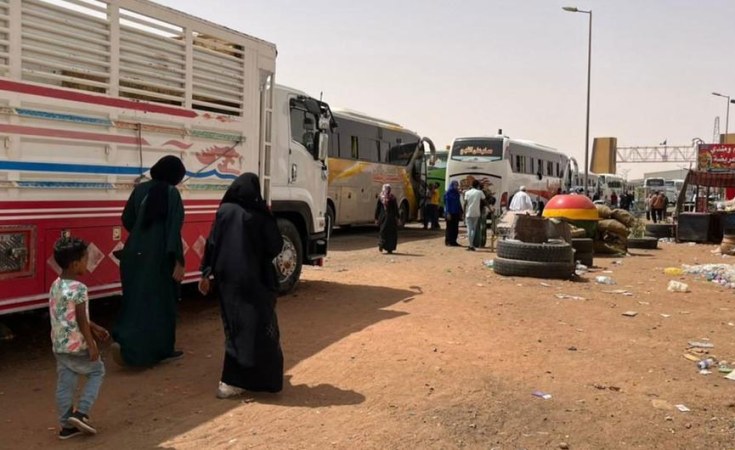An intervention force to accompany ongoing peace processes could ease the humanitarian crisis and protect critical infrastructure.
While international and regional responses to the crisis in Sudan have been swift, they haven't stopped the violence perpetrated against civilians. Slow, ineffective talks have seen the country's devastating humanitarian crisis worsen.
Since fighting broke out between General Abdel Fattah al-Burhan and Mohamed Dagalo (Hemedti) on 15 April, several processes have tried to bring the warring parties to the negotiating table.
The Jeddah talks led by the United States and Saudi Arabia continue to produce tenuous temporary ceasefires that don't hold. The African Union (AU) established the Expanded Mechanism to connect disparate peace processes and drew up a roadmap for resolving the conflict. East Africa's Intergovernmental Authority on Development (IGAD) adopted a similar roadmap and added Ethiopia to the delegation led by Kenyan President William Ruto.
Yet having multiple peace processes has further undermined the possibility of resolving the conflict. With the failure of several ceasefires, limited leverage of regional and international actors and burgeoning humanitarian needs, the situation needs an action-oriented response. Mediation is vital but takes time and could be futile if both parties maintain a zero-sum position and believe in all-out victory.
Slow, ineffective talks have seen the country's devastating humanitarian crisis worsen
The recent announcement that the Jeddah talks may be suspended if the warring parties fail to observe the latest ceasefire shows that the time may not be ripe for negotiation. Meanwhile, levels of violence and sexual assault are rising, and the looting and destruction of critical infrastructure require a complementary peacemaking effort.
Sudan needs an AU-mandated and -supported intervention force to establish a humanitarian corridor and protect civilians and critical infrastructure. The AU's principles and purpose call for a more proactive response that reflects a commitment to safeguarding human lives and upholds the continental ideals of non-indifference.
The AU's peace support operations doctrine and the African Standby Force concept provide relevant scenarios for such an intervention. A force with a quick reaction capacity could help create conditions for conflict resolution, support humanitarian and relief efforts and ensure broader stabilisation.
Considering the rapid escalation, spread and transformation of the conflict to intercommunal violence in areas such as El Geneina, a short-term objective should be to end the hostilities. A small to medium-sized contingent capable of securing a safe zone in Khartoum and creating humanitarian corridors could be replicated in restive West Darfur. Timing of the intervention is crucial and attempts at post-conflict reconstruction demand an expedited show of force now.
An AU force could establish a humanitarian corridor and protect civilians and critical infrastructure
In the medium term, and as the AU's Expanded Mechanism or its parties succeed in maintaining a ceasefire or establishing a peace agreement, the intervention force can support a political transition. A major challenge to African peace operations is their disconnect from political objectives. Without the peace framework agreed to in December 2022, any intervention force in Sudan should, in the long term, aim to establish a political framework to achieve a lasting solution.
The partners involved in the intervention force are also important. Given the many actors trying to find peace in Sudan, the right partnerships are needed to anchor the deployment. The AU-IGAD-UN Trilateral Mechanism established in 2022 would work. It was built on existing institutional strengths and aimed to reduce rivalries threatening Sudan's political transition.
A joint deployment would combine the legitimacy of the AU and IGAD, in line with the principle of subsidiarity, which gives regions the first option to intervene. It would also benefit from the UN's capacity to provide resources and ensure the intervention's longevity.
Although IGAD doesn't have the institutional frameworks to deploy, current practice in Africa has seen regional blocs contributing troops to peace support operations. While this may have an upside, considering that several of Sudan's neighbours could do so, it should be approached with care given competing regional interests and alignment of external actors with the warring factions.
A proactive AU response is needed that protects lives and upholds the ideals of non-indifference
There would be several issues to iron out, including the authorisation, mandating and financing of the peace force. Long-standing sensitivities between the UN and AU, particularly regarding the UN-AU Mission Hybrid Operation in Darfur (UNAMID), may resurface. The recent spike in violence in Darfur also questions the timing of UNAMID's closure. Nonetheless, UNAMID should provide both institutions with lessons to inform the deployment and exit of an AU force in Sudan.
In the short term, a successful AU deployment may be seen as favouring one of the belligerent parties. However, it would give regional and international actors some leverage to manage the parties' interests in the medium term. It could serve as both a carrot and a stick to ensure compliance with agreements and a reset of the political transition.
The AU's Constitutive Act and the institutions that implement it were founded on member states' willingness to go the extra mile, take risks and act decisively in response to continental threats.
Sudan's crisis is precisely the kind of situation that prompted the AU's transition from non-interference to non-indifference. To make an impact, the continental body should act with haste and deploy in line with Constitutive Act Article 4(h) to maintain peace and security in Sudan.
Maram Mahdi, Researcher, Africa Peace and Security Governance, ISS Addis Ababa
This article was first published by PSC Report.


